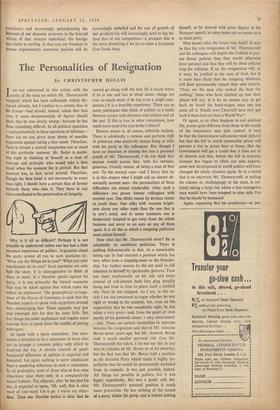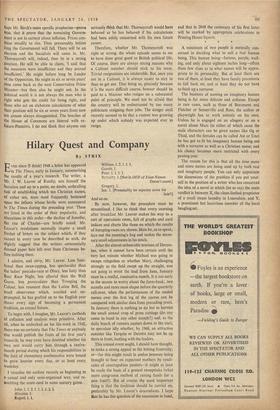The Personalities of Resignation
By CHRISTOPHER HOLLIS IAM not concerned in this article with the imerits of the issue on which Mr. Thorneycroft resigned, which has been sufficiently widely dis- :ussed already, but I confess to a certain bias in is favour---2and should, indeed, retain that bias :ven if some demonstration of figures should ihow that he was clearly wrong—because he has lone something difficult. In all political questions —and particularly in these questions of inflation— here are on any given issue plenty of sensible trguments against taking a firm stand. Therefore, here is always a natural temptation not to stand tt this particular moment. Mr. Butler is doubt- ess right in thinking of himself as a man of =ourage and principle who would take a firm ;tand when the moment for it arrived. But that noment has, in fact, never arrived. Therefore, hough the firm stand is not necessarily in every • :ase right, I should have a certain bias of favour 'owards those who take it. They have at any 'ate contributed to the preservation of integrity.
Why is it all so difficult? Perhaps it is not 3ossible to understand unless one has had a little 3ersonal experience of politics. Arguments about he party system all run to such questions as : What can the Whips do to you?' What can your :onstituents do to you?' Such questions are only tall the story. It is unimaginative to think of hem as more. If a Member speaks against his arty, it is not primarily the formal measures hat may be taken against him which make the ndeal so unpleasant. The geographical arrange- nent of the House of Commons is such that the VIember expects to speak with supporters around iim, encouraging him. Those opposite may jeer Ind interrupt, but for that he cares little. But 'ew things are more unpleasant and require more :ourage than to speak from the middle of jeering :olleagues.
So again with a party committee. The corn- nittee is intended to be a committee of those who ire to arrange is common policy with which to :onfront the ,foe. A certain amount of good- iumoured difference of opinion is expected and olerated, but again nothing is more unpleasant hen a sundering difference in such a committee. n all probability most of those who at first raise )bjections raise them only in a comparatively :asual fashion. The objector, after he has had his lay, is expected to agree, 'Oh, well, that is what nost of you want. Let it go. I waive my objec- ion.' Then one Member makes it clear that he cannot go along with the rest. (It is much worse if he is one and has to stand alone—things are ever so much easier if he has even a single com- panion.) It is a horrible experience. There are so many politicians who think of politics as a battle bbtween armies with deserters and traitors and all the rest. If this is true in other committees, how much more must it be true in the Cabinet?
Human nature is, of course, infinitely various. There is admittedly a curious and perverse type of politician who positively enjoys being at odds with his party or his colleagues. But, ;though I have no intention of turning this into a personal sketch of Mr. Thorneycroft, I do not think that anyone would accuse him, with his nervous, generous, friendly nature, of being a man of that sort. To the normal man—and I fancy that he is in this respect what I might call an almost ab- normally normal man—the personalities of these difficulties are almost intolerable. After such a difference one passes former colleagues with averted eyes. One slinks round by devious routes to avoid them. One talks with vacuous bright- ness about any other topic than the one that is in one's mind, and in many moments one is desperately tempted to get away from the whole business and never to set eyes on any of them again. It is all this to which a resigning politician must submit' himself.
Now what has Mr. Thorneycroft done? He is admittedly an ambitious politician. There is nothing dishonourable in that. At a remarkably young age he had attained a position which has very often been a stepping-stone to the Premier- ship. For further success he did not need to call attention to himself by spectacular gestures. Time was most emphatically on his side and every counsel of self-interest bade him plug steadily along and trust to time to prove itself a faithful ally. Now he has resigned. As I say, in this ar- ticle I am not 'concerned to argue whether he was right or wrong in his analysis, but, even on the supposition that he was completely right, he has taken a very great—and, from the point of view purely of his personal career, a very unnecessary —risk. There are certain similarities in opposite between his resignation and that of Mr. Aneurin Bevan seven years ago, but Mr. Aneurin Bevan took a much smaller personal risk than Mr. Thorneycroft has taken. I do not say this in any way in criticism of Mr. Bevan or of his sincerity; but the fact was that Mr. Bevan held a position in the Socialist Party which made it highly im- probable that he would be permanently excluded from its councils. It was just possible, indeed. All things are possible in politics, but it was highly improbable. His was a pretty safe bet. Mr. Thorneycroft's personal position is much more precarious. He has nothing of the nature of a party within the party, and is indeed putting himself, as he showed with great dignity in his Newport speech, to some pains not to create such an inner party.
Who knows what the future may hold? It may be that the very resignation of Mr. Thorneycroft and his colleagues will inspire the Cabinet to pur- sue firmer policies than they would otherwise have pursued and that they will by these policies stop the inflation. If so, the resignations will, as it were, be justified in the eyes of God, but it is more than likely that the resigning Ministers will have permanently ruined their own careers. 'These are the men who rocked the boat for nothing,' those who have climbed up into their places will say. It is by no means easy to get back on' board the band-wagon once one has come off it. Would even Churchill have ever got back if there had not been a World War?
Or again, as so often happens in real political life, events quite different from those in the minds of the contestants may take control. It may be that the Government will pursue weak policies but that the fall in world commodity prices will prevent a rise in prices here at home, that the Government will get a credit that it does not at all deserve and that, before the fall in overseas incomes has begun to affect our own exports, some new development in world politics will have changed the whole situation again. So in a world that is so uncertain Mr. Thorneycroft, in nailing his colours so challengingly to the mast, is cer- tainly taking a large risk where a less courageous man would have been tempted to play safe. For that he should be honoured.
Again, supposing that his prophecies—or per- haps Mr. Birch's more specific prophecies—prove true, that it prove that the remaining Govern- ment is not in earnest about inflation. Prices con- tinue steadily to rise. Then presumably before long the Government will fall. There will be an election and the Socialists will come in. Mr. Thorneycroft will, indeed, then be in a strong Position. He will be able to claim, 'I said that the measures were insufficient and they proved Insufficient.' He might before long be Leader of the Opposition. He might in six or seven years' time come back as the next Conservative Prime Minister—but then also he might not. In the Political world it is not always the man who is right who gets the credit for being right, and those who act on elaborate calculations of what their position will be six or seven years from now are almost always disappointed. The benches of the House of Commons are littered with ex- future-Premiers. I do not think that anyone can
seriously think that Mr. Thorneycroft would have behaved as he has behaved if his calculations had been solely concerned with his own future career.
Therefore, whether Mr. Thorneycroft was right or wrong, the whole episode seems to me to have done great good to British political life. Of course, there are always strong reasons why a Cabinet member should stick to his team. Trivial resignations are intolerable. But, once you are in a Cabinet, it is always easier to stay in than to get out. That being so, precisely because it is the more difficult course, honour should be paid to a Minister who resigns on a substantial point of principle. We need not be afraid that the country will be embarrassed by too many politicians resigning their jobs. The danger until recently seemed to be that a custom was growing up under which nobody was expected ever to resign.



































 Previous page
Previous page